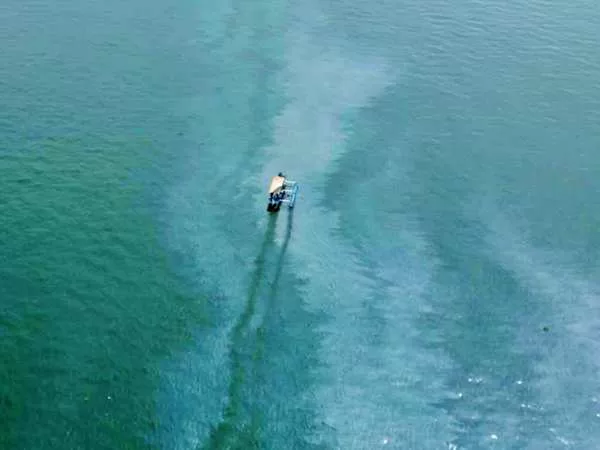A devastating tanker accident off the coast of Manila has claimed one life and posed a significant threat of an unprecedented oil spill in the Philippines. As the nation grapples with the aftermath, concerted efforts are underway to mitigate the environmental impact.
Swift Response to Minimize Leak
The tanker sank early Thursday amidst severe weather conditions spurred by Typhoon Gaemi and the seasonal monsoon. This unfortunate event resulted in a tragic loss and left the Philippines facing a potential environmental crisis. However, prompt actions by the authorities have significantly reduced the oil leakage.
Lieutenant Commander Michael John Encina from the Bataan Coast Guard Station reported that divers began sealing the vessel’s leaking valves on Saturday. Their efforts reduced the oil flow from a dangerous 7.5 liters per minute to a manageable one liter per hour. Encina assured that the leakage was now “minimal scale” and “very controllable.”
Aerial Inspections Show Improvement
An aerial inspection on Monday revealed a significant reduction in the size of the oil slick in Manila Bay. The slick, which measured between 12-14 kilometers on Saturday, had decreased to approximately 3.2-6.4 kilometers. This improvement underscores the effectiveness of the ongoing containment measures.
Salvage Operation Set to Begin
The tanker, carrying 1.4 million liters of industrial fuel oil, now rests 34 meters below the sea surface. The coast guard announced that the offloading of the oil would commence on Tuesday, with the operation expected to take about 10 days. The initial phase involves transferring 300,000 liters of fuel to two other vessels, which should enable the tanker to float and be towed to a safer location for complete offloading.
Preventing a Historical Spill
Rear Admiral Armando Balilo highlighted the urgency of the situation, warning that if the entire cargo of industrial fuel oil were to leak, it would result in the largest oil spill in Philippine history. The potential impact on Manila and its shoreline is a major concern, given the tanker’s location within Manila Bay.
Balilo confirmed that the diesel fuel used to power the tanker was leaking, but so far, the industrial fuel oil cargo had remained intact. Authorities are racing against time to ensure that the containment efforts prevent any further leakage.
Rescue Efforts and Investigation
The accident claimed the life of one crew member, while 16 others were rescued. The body of the missing crew member was recovered after hours of searching the choppy waters. An investigation into the cause of the sinking is underway. Initial findings suggest that the vessel did not violate any heavy weather sailing rules, as no Public Storm Warning Signal was raised when the MT Terra Nova departed Limay.
Environmental and Economic Concerns
The environmental impact of the spill is a major concern, with thousands of fishermen and tour operators relying on the affected waters for their livelihoods. Marine environmental protection personnel have been mobilized to help contain the oil slick, and the coast guard is collaborating with oil spill response organizations and companies like Petron, which have offered assistance.
The leader of a local fishing group, Pando Hicap, expressed alarm over the spill and urged authorities to expedite containment efforts. “The livelihood of our fishermen is dependent on the waters. They don’t have any alternative,” he emphasized.
Historical Context of Oil Spills in the Philippines
The Philippines has faced serious oil spills in the past. In February 2023, a tanker carrying 800,000 liters of industrial fuel oil sank off the central island of Mindoro. The spill contaminated the waters and beaches, devastating the fishing and tourism industries. The oil spread over hundreds of kilometers of waters known for their rich marine biodiversity, forcing thousands of fishermen to stay ashore and banning swimming.
Another significant spill occurred in 2006 when a tanker sank off the central island of Guimaras, releasing tens of thousands of gallons of oil. The spill destroyed a marine reserve, ruined local fishing grounds, and covered stretches of coastline in black sludge.
Conclusion
As efforts to offload the fuel and contain the spill continue, the authorities remain vigilant in preventing a repeat of past environmental disasters. The swift and coordinated response to the tanker sinking off Manila highlights the importance of preparedness and effective crisis management in protecting both the environment and the livelihoods of those dependent on it.

